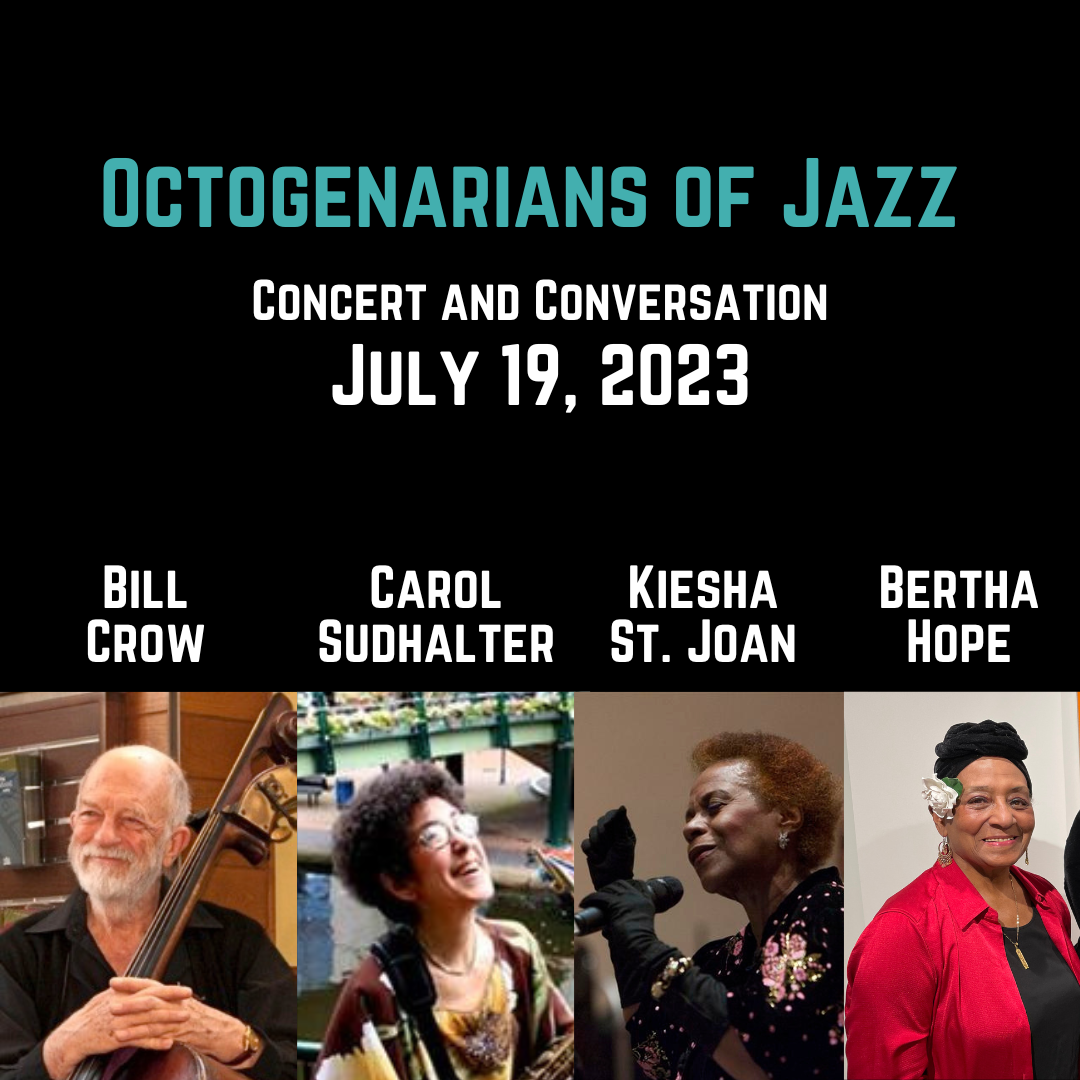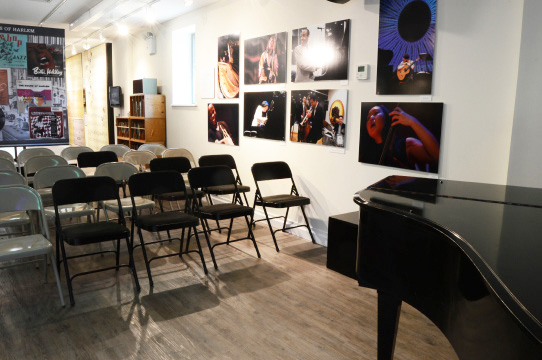Past Events
NEW DATE: Octogenarian Women of Jazz
Join us for a special night of music with the Octogenarian Women of Jazz, a a band featuring saxophonist/flutist Carol Sudhalter, pianist Bertha Hope, and widely popular vocalist Keisha St. Joan. In addition, the concert will include bassist Bill Crow, now 95.
If you purchased tickets to the June 7th show that was postponed, your tickets will be honored at this show.
In addition to a night of original tunes and classic standards, the band members will share stories of their career with the audience.
About the Artists:

Carol Sudhalter flutist, baritone and tenor saxophonist, placed 9th for Best International Jazz Flutist in DownBeat Magazine’s 77th Annual Jazz Readers’ Poll 2012. Profiled in Wikipedia, Sudhalter in 1922 was honored to participate in the debut performance of composer/pianist Mickey Tucker’s Spiritual Collage for Saxophone Quartet and Orchestra, in Bloomington, Indiana, alongside such legendary players as Cyrus Chestnut and Gary Bartz.
Since 2016, Sudhalter has been director and house band leader of the Flushing Town Hall Louis Armstrong Legacy Monthly Jazz Jam, one of the leading jazz events in the borough of Queens. Within her term, the jam has had great success and doubled In attendance.
Carol was the first graduate of Smith College to become a jazz musician. She played with the first-ever all-female Latin band, Latin Fever, at the Salsa Festival at Madison Square Garden alongside Tito Puente. She founded, and plays baritone sax in, the Astoria Big Band, which has received 20+ Performance Grants, and has played at Mary Lou Williams Festival, Kennedy Center. The band presents both a concert of works by women composers and a “Jazz History of Queens”.
She teaches flute, sax, clarinet and piano, as well as masterclasses in “English Diction for Singers”, throughout the U.S. and in Italy. Sudhalter is a recording artist of Alfa Music record label, Rome. Sudhalter’s 2019 CD ‘Carol Sudhalter Quartet Live at St. Peter’s Church” (on baritone sax and flute), was reviewed in the June 2019 issue of Down Beat Magazine.

Bertha Hope is a Jazz pianist and educator. Born in Los Angeles, California, she began having an interest in jazz through the playing of Bud Powell. In the late 1950s, Bertha began working professionally in Los Angeles Jazz clubs, where she met the great Elmo Hope, whom she later married and with whom she worked extensively. In 1961, the two moved to the East Coast and released a duo album for Riverside, entitled “Hope-Full.” Some years after Elmo died, Bertha created the ELMOllenium project to preserve the musical legacy of her late husband, by performing and teaching his work to other artists.
Hope was the director of the music program at the Goddard Riverside Community Center in New York City from 1969 to 1982. She co-created a band with the help of Cobi Narita, a music porter who worked to create collectives and venues for female musicians. In 1982, she joined the all-female Kit McClure Band as a pianist and vocalist. With Kit’s band, Bertha performed across the East Coast and toured extensively in Japan.
During the same period, Bertha formed Jazzberry Jam!, an all-women quartet. Jazzberry Jam! performed throughout the tri-state area at some of the most prestigious Jazz clubs and venues, including: Dizzy’s Club Coca-Cola at Jazz at Lincoln Center, Bradley’s, The Jazz Standard, Knickerbocker, Birdland, the Apollo Theater, the Schomburg Library, The Brooklyn Academy of Music, and The Brooklyn Museum. National tour performances included the Mary Lou Williams Jazz Festival at Washington, D.C.’s Kennedy Center, The Savannah Jazz Festival in Georgia, and the Renaissance Jazz Festival in Indianapolis, Indiana. In 1998, at the invitation of the legendary trumpet virtuoso, the late Nat Adderley, Jazzberry Jam! performed at Florida Southern College’s annual Child of the Sun Festival, resulting in their first CD together, entitled “Jazzberry Jam! Live.”
Internationally, in 1999, Jazzberry Jam! was featured in a documentary entitled “Les Femmes du Jazz” for the French Arts Channel. Written and directed by Gilles Corre, this film received the award for Best Documentary at France’s Bairritz Film Festival. They also performed at Marians Jazzroom in Bern, Switzerland.
Bertha is the recipient of two lifetime achievement awards. The first in 2002 from Cobi Narita’s Jazz Coalition. The second, given by the late Dr. Billy Taylor in 2005, at the Mary Lou Williams Jazz Festival at Kennedy Center in Washington, D.C. The International Women in Jazz honored Bertha in 2012 with its Jazz award. In 2014, her 3-year oral history project was made available at the Library of Congress, and the following year, she was presented with the Bronx Living Legend Award by fellow artist Bobby Sanabria at the Bronx Music Heritage Center where Bobby is the co-artistic director, together with his wife, Elena Martinez. In 2018, Bertha won the National Jazz Museum in Harlem’s Legends of Jazz Award. Additionally, in 2021, Bertha was feted as a Jazz Trailblazer, receiving an Osceola Macarthy Adams Award.
There are 4 CDs released by Bertha Hope, all of which are available on Amazon. They are entitled: “Elmo’s Fire,” “In Search Of Hope,” “Between Two Kings,” and “Nothin’ But Love.”

Seasoned jazz vocalist Keisha St. Joan, age 84, a fixture on the New York City scene for decades, is a “garrulous, warm, expansive presence with an easy laugh…but a closer look reveals a depth of character that is at once expressed in her soulfulness on the bandstand, and in her unyielding commitment to truth and dignity in her daily life” (Todd Weeks).
Keisha has performed with legends Lionel Hampton, Doc Cheatham and Big Joe Williams.
Born Joan Broadbelt on 119th Street in Harlem in 1939, she gained access, through family connections, to recordings of opera, which became a fixation: she remembers listening to 78’s of Marion Anderson and Enrico Caruso when barely out of diapers. At age 5, she announced that she was going to be an opera singer. The family attended St. Cyprian Episcopal, on West 63rd Street, and lived in the Phipps Houses, where Thelonious Monk also lived: she would hear him playing piano. Shortly after Keisha began singing lessons, the soloist at St. Cyprian became ill, and Keisha, a mere age 12, took her place. At 17, St. Joan was already singing professionally with the Harlem Opera Group. She appeared in “La Boheme,” and “Carmen,” and sang the role of Marguerite in “Faust.” Soon she was exposed to Miles and Dave Brubeck, and Stan Kenton. Then shortly thereafter, to Irene Reed, Nancy Wilson, and Carmen McRae. At that time she was a coloratura. A jazz musician neighbor, Charlie Woodson, by way of convincing her to join his jazz group, took her to the High Hat Club in Camden, NJ., where she sang ‘Autumn Leaves.’ and was instantly hired.
Keisha moved back to New York City from Philadelphia in 1968. At age 36, finally feeling ready to begin a full-time career in music, she left her day job. She met and heard the legendary hipster vocalist Babs Gonzales, who took her to meet Pastor John Garcia Gensel at St. Peter’s, the jazz church. Gensel introduced her to Cobi Narita of the Big Apple Jazz Women/Universal Jazz Coalition, and from there, she began playing with Joe Newman, Al Grey, Frank Wess, Bertha Hope, and Carline Ray. At the jazz church, she was often featured at the weekly Jazz Vespers service and at the famed annual All Night Soul celebration.
During these years, St. Joan appeared at Small’s Paradise in Harlem and other venues, with groups such as Frank Foster’s Living Color and the Loud Minority big band; and with the bands of David “Fathead” Newman and Charli Persip. She began a regular engagement with pianist Maurice Waller, son of Fats. In the 70s, she began to front her own bands, which included artists such as pianists Stan Hope and Eric Reed, bassists Ollie Richardson and Peck Morrison, trumpeter Richard Williams, and the great hard bop drummer Walter Perkins.

Bill Crow began his career as a jazz bassist with the Teddy Charles Trio in 1950. In the 1950s and 60s he was featured on the big bands of Claude Thornhill, Gerry Mulligan and Benny Goodman, as well as many small jazz groups including the Stan Getz Quintet, the Terry Gibbs quartet, the Marian McPartland Trio, the Gerry Mulligan Sextet and Quartet, the Al Cohn and Zoot Sims Quintet, the Marty Napoleon Trio, the Gene DiNovi Trio, Jay and Kai, and the Bob Brookmeyer and Clark Terry Quintet.
He made several tours of Europe and Japan with Mulligan, played with Goodman at the Seattle World’s Fair and on his Russian tour in 1962, and then became a member of the house band at Eddie Condon’s nightclub in New York for a year. From 1965 to 1970 he played with pianist Walter Norris at the New York Playboy Club.
Between 1970 and 1983 Crow played in the pits of a number of Broadway shows, including the long runs “The King and I” and “42nd Street,” doubling on string bass and tuba. During this period he also frequently appeared in jazz venues with the Al Cohn quartet, the Bernie Leighton trio, the Kenny Davern quintet, the Eddie Bert quartet, and guitar duos with Chuck Wayne, Tal Farlow, Eddie Diehl, Carl Thompson and Joe Puma.
In the 1990s Crow appeared with many jazz groups, including the Kansas City Sound, the Doug Proper Quartet, and small groups led by Dick Sudhalter, Giacomo Gates, Rio Clemente, Joe Morello, Carmen Leggio, Joe Beck and Marian McPartland. And for several years he appeared weekly with a trio at the Red Hat on the River in Irvington NY. He now appears frequently with the Ryo Sasaki Trio in New York, and with his own groups in the greater New York area. A sideman on numerous recordings with other jazz leaders, he has also made two compact discs with his own quartet for Venus Records of Japan.
Since 1983 Bill Crow has written a monthly humor column, “The Band Room,” for Allegro, the journal of Local 802, American Federation of Musicians. He is also the author of two books. His first, Jazz Anecdotes, published by Oxford University Press in 1990, was voted “Best Jazz Book” in the 1991 JazzTimes readers’ poll. His second, an autobiography titled From Birdland to Broadway, was published by Oxford in 1992. His books are available in paperback editions, and have been published in Japanese translations that were done by noted author Haruki Murakami. A Korean translation of Jazz Anecdotes was published in 2001. An expanded edition of his first book is now available in paperback, Jazz Anecdotes, Second Time Around.
NEW DATE: Octogenarian Women of Jazz

National Jazz Museum in Harlem

